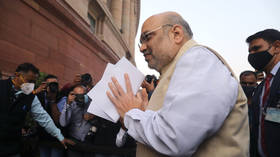India to revise colonial-era laws, impose death sentence for mob lynching

The Indian government has proposed three bills in the lower house of parliament, the Lok Sabha, on Friday, in a drive to overhaul key criminal laws which trace their origin to the British colonial-era period and have served as the core of the criminal justice system of the country for more than 160 years.
Ahead of the country’s 76th Independence Day celebrations on August 15, Indian Home Minister Amit Shah announced the move in keeping with the ruling Bharatiya Janata Party (BJP)-led bid to obliterate the colonial past.
The three bills submitted to parliament on Friday, the last day of the monsoon session, seek to replace the Indian Penal Code (IPC) of 1860, the Code of Criminal Procedure (1973) and the Indian Evidence Act (1872). All the legislation has been referred to a parliamentary panel for review, and is likely to be enacted since the BJP enjoys a clear majority in both houses of the parliament.
Shah explained the rationale behind replacing the British laws, which, according to him, were designed “to punish and not give justice.” Replacing them will help to protect the rights of the Indian citizen, Shah said, adding that the new laws will be used to “provide justice” while punishment will be given “to create a sentiment of stopping crime."
Meanwhile, some of the novelties in the bills proposed by the government include the scrapping of Section 124A of the IPC, which deals with sedition, and incorporating new sections that prescribe harsher punishments for acts of secession, armed rebellion, subversive activities, separatist activities or endangering the sovereignty or unity and integrity of India.
The sedition law was first drafted by British historian and colonial administrator Thomas Macaulay in 1837 and was added to the IPC in 1870 by James Stephen as Section 124A. The proposed new law replacing sedition appears to be aimed at curbing possible threats to the country’s internal security, such as the ongoing ethnic conflict in the remote northeastern state of Manipur, which reached day 100 on Thursday.
The government also plans to introduce the death penalty for mob lynching as a deterrent to prevent murder, and the minimum punishment will be a jail sentence of seven years.
The bills seek to prioritize punishment for crimes against women and children, murders, and “offenses against the state.” For example, a person convicted of gang-rape could be sentenced to 20 years in prison and the punishment could be extended to a life term depending on the gravity of the crime. The government seeks to tackle the challenges of organized crime and terrorist activities — especially cross-border threats from neighboring Pakistan — as new offenses for these kinds of criminal activities have been added with punishments aimed at deterrence.
The proposed penalties include a one-year jail term for bribing voters during elections. For the first time, a sentence of community service will be possible for petty offenses. In addition, according to the proposed law, an absconding criminal can be tried in absentia. Offenses have also been made gender neutral in the new code.












